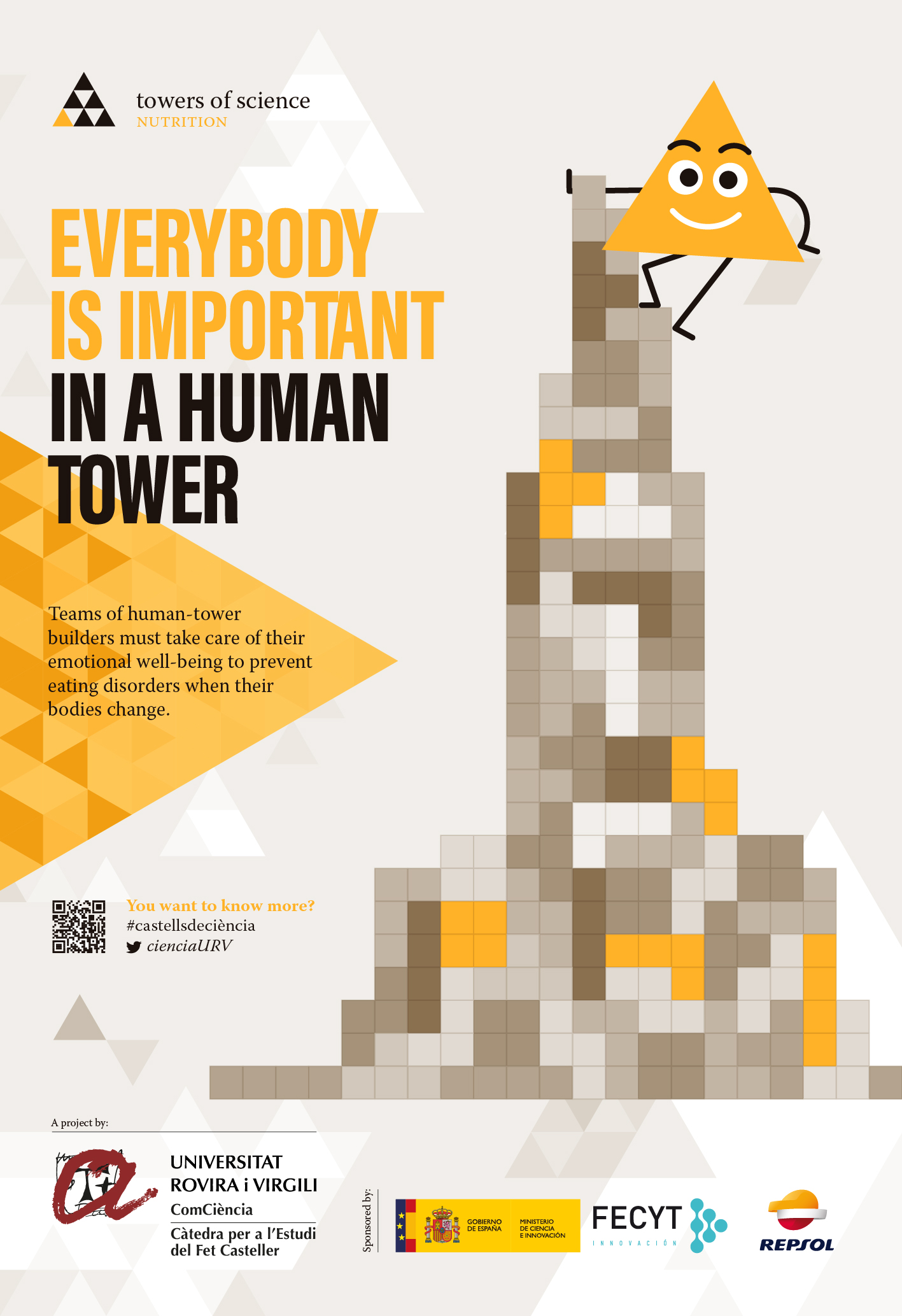
Fina Canals and Victòria Arija

The architectural structure of human towers requires people of different builds. In order to improve the performance and health of tower builders, several teams have engaged in courses or training programmes so that they can rise to the considerable challenges they face more successfully. However, good safety and prevention practices do not always take into account that physical characteristics and perfectionism, both necessary for the construction of human towers, are variables that can emotionally destabilize some of the team members. The social and psychological aspects of building towers are very positive: they encourage sociability, hard work, empathy, personal satisfaction and, in general, emotional well-being. So, how is it possible that people have started saying in recent years that young female tower builders are a group that may be at risk of developing eating disorders?
In eating disorders, negative beliefs about body shape and body weight are accompanied by food-related behaviours - including both restriction of intake and binge eating - which involve excessive physical exercise or other behaviours such as vomiting. Behind this lack of consideration for the body are hidden factors such as low self-esteem, high social sensitivity or excessive self-demand. These disorders generally occur in adolescents and young adults, and largely in the female gender. They paradoxically start with "voluntary" changes in behaviour and can become serious, cause physical and mental complications and affect quality of life. The main eating disorders are anorexia nervosa, bulimia nervosa and binge eating, and it is estimated that between 5.5% and 18% of young women worldwide have been affected, a number that has increased in the post-Covid period.
The data from the study "Human towers and eating disorders: study of the characteristics of human-tower building that can influence the development of an eating disorder and analysis of the incidence of eating disorders and associated behaviours in young female tower builders", by Mar Solé Amenós, winner of the 5th CEPAC Prize, highlights the power that towers have in the social and personal lives of girls. In this environment, physical constitution and weight are important in terms of the contribution they can make to the tower.
The perception girls have of body image can be influenced by their identity as tower builders and make them doubt that they have the right weight for the position they are asked to occupy. For example, in the upper floors of the tower's trunk it is important to be thin, agile and strong; that is why they are mostly occupied by teenage girls, whose bodies are in a stage of change and development. Therefore, an understanding of the importance of weight and physical fitness can lead to a fear of gaining weight and eating and exercise habits that may be the beginning of the disorder. It should also be mentioned here that the uniform of tight white elastic trousers gives a body image, sometimes unwanted, that coincides with social expectations.
Although adolescent girls are the group most at risk, the need for the members of the core to be strong and have a particular build can put young men at greater risk of another mental health problem: vigorexia. This condition is an obsession with being more muscular, which manifests in the form of excessive physical exercise and changes in diet. At the moment we do not have any data on what impact it has in the world of human tower building.
Despite the fact that we have referred to these disorders as mental health conditions that can affect some members of tower-building teams, the evidence published by Mar Solé Amenós, a master's degree student in General Health Psychology at the University of Girona, does not show that girls who build human towers are at greater risk than girls who do not build towers. However, the factors mentioned remind us that some aspects must be monitored if food and health problems are to be prevented.
The important thing is to offer the young people in this environment a healthy eating model and not suggest that weight is a necessary condition for the identity of a tower builder. Jordi Juanico, a tower builder and educator who works in the Eating Disorders Unit of the Sant Joan de Déu Hospital in Barcelona, argues that the young people in the team must be encouraged to do all kinds of activities so that the girls who no longer climb to the top of the tower because they have grown and weigh too much do not think that they are worthless and continue to feel that they are part of the team. If the head of the team or the person responsible for the kids detects that minors have suddenly changed their eating patterns, are doing too much exercise or are concerned about their weight, they should notify their parents or guardians. Likewise, there is no need for the girls on the upper tiers to wear specially tight trousers; rather, clothing should be designed for comfort in all positions of the tower.
Everyone who takes part in tower building must adapt to how their body changes and everyone must acquire positive values. Building human towers must promote emotional well-being and at the same time be a social and cultural asset.
